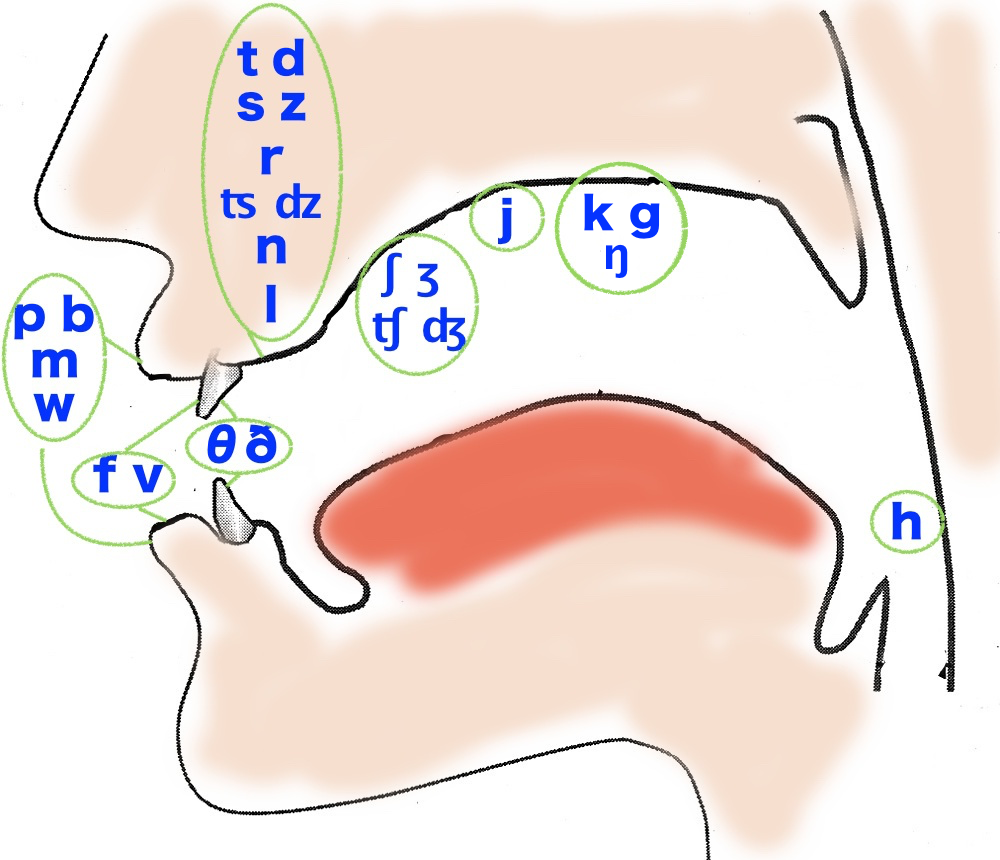2011年5月17日
R L V Th Wh F の発音に気をつける
Rは「ラ・リ・ル・レ・ロ」じゃなくて、「ルア・ルイ・ルウ・ルエ・ルオ」
riceは、「ライス」じゃなくて「ルアイス」と巻き舌。
rabbitは、「ラビット」じゃなくて「ルアビット」と巻き舌。
Lの発音は、e + L、「エ」の口で「ウ」と発生(ウを混ぜる)
letterは、「(ェゥ)レター」で舌先を前歯裏に着ける
ダークLは舌先を前歯に着けなくていい:will、cool のように L がその単語の最後の音の場合
(alrightやalmostのLの後に子音が続く場合もだがこれはLight Lの方がいいかも、どちらもライトLでOKで意識はコレ)
Dark L (暗いL, ダークL) とは?発音方法をネイティブが解説するよ!
Rの発音は桑田圭祐のイメージで舌を丸める
Lは山瀬まみのイメージで舌を前歯の裏にはりつける
Rは巻き舌で大丈夫だが、意識が必要な横口のL
口の形として、Rは口を丸めO形だが、Lは口をスマイルで-形で横に広げる
Red lorry, yellow lorry
ゥレッド ローゥリィ イエロー ローゥリィ
縦 横 縦 横 横 縦
■フォニックソング
http://www.youtube.com/watch?v=saF3-f0XWAY日本語読みの矯正にもいい
■イントネーション、感情と句読点
Let's eat Grandpa!
Let's eat, Grandpa!
■発声
口を大きく上下に開き、奥で発音し、また手前の口や舌を良く動かす
奥行き、奥に空間、上あごで発音→口腔奥と奥舌が上がる
つ 全上げ息のフロー、口を横ワイドにも開く意識
キーは1度下で、でも口は大きく開ける
リズムで発声し声を前に出す(首を振っても可)
Prolong(伸ばす)、Drop jaw(顎を落とすように口をあける)、Softenも注意点
抑揚を音の高低で大きく付ける、歌と思う?
■日本語と英語の切り替え
意識的に切り替えた方がよい、個別の方法は知っていても切り替えて使うとの違う
日本語は高周波あまり含まないが、英語は含むため、日本人はベースの低音を入れて高音を聞きやすくするため
投稿者 funa : PM1:49
| 英語のコツ - Tips
| コメント (0)
| トラックバック (0)
2010年8月11日
連鎖関係詞節は事実関係を誤認ししやすい
■構造
2種類があると考えると分かり易い 1)関係詞+S think V 2)関係詞+S think+S V
従属文の従属接続詞thatと関係代名詞で置き換えられた対象が省略されている
■連鎖関係詞節が入っているかの判断
S + think/believe/feel/suppose/say/know/hearなどのthat節を取る動詞が関係代名詞の後ろに挿入されている
■理解の仕方
先行詞の前のものに対しての感覚を表現するのではなく、
対象が省略されてわかり難いが、後ろの文に対しての感覚を表現している。
元がI think that-だからね。I thinkを省略してみる。
1)関係詞+S think V
There's Mr. Jones, who they declare is the richest man about here.
There's Mr.Jones.
They declare that Mr.Jones is the richest man about here.
He is a boy who I think is my best friend.
He is a boy.
I think that he is my best friend.
The man who I think was honest deceived me.
The man deceived me.
I thought that he was honest.
2)関係詞+S think+S V
My parents brought me books that they thought I ought to read.
My Parents brought me books.
They thought that I ought to read the books.
This is a dictionary which I believe you want.
This is a dictionary.
I believe that you want it.
-------------------
Do the thing. You think that it is right.
1) 埋め込み:Do the thing [ you think that it is right].
2) 関係詞化(接続詞thatは省略):Do the thing [ you think _ which (that) is right].
3) wh 移動:Do the thing [ which (that) you think _ is right].
→ Do the thing ←<which (that) you think is right>.
さらにthe thing which を whatへ統合すると
→ Do [what you think is right].
「自分が正しいと思うことをやりなさい」
http://www.ravco.jp/cat/view.php?cat_id=4469
投稿者 funa : AM8:57
| 英語のコツ - Tips
| コメント (0)
| トラックバック (0)
2010年5月20日
■修飾語
muchは主に否定文・疑問文で使われる i have a lot of work to do.
過去分詞を修飾する場合はmuchを使う I'm much obliged to you.
現在分詞を修飾する場合はveryを使う He came up with a very interesting idea.
前置詞句を修飾する場合はfarを使う The assignment seems to be far beyond her ability.
比較級を修飾する場合はmuch / far / alot / lots / yet を使う
He runs much faster than him.
I need a lot more flour to make this dough.
Science is far more than a collection of facts and methods.
She seemed lots better.
It'a yet more difficult problem.
最上級を修飾する場合はby far / veryを使う
She is by far the best student.
I'll be home by five at the very latest.
投稿者 funa : AM3:39
| 英語のコツ - Tips
| コメント (0)
| トラックバック (0)




